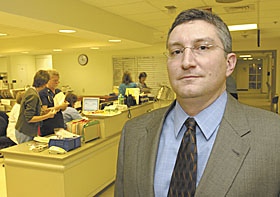Study Shows Alcohol Counseling
Helps Emergency Room Patients
 |
| Rob Aseltine, an associate professor of behavioral sciences and community health, at the Health Center’s emergency department. Aseltine headed a study of emergency room patients with drinking problems. |
|
Photo by Peter Morenus |
Emergency department physicians who take a few minutes to talk to patients about alcohol use can help them reduce their drinking, according to a new study involving 1,100 patients at 14 emergency departments around the country.
The results are noteworthy because about a quarter of the patients in emergency departments have alcohol problems, but they seldom receive screening or treatment for their drinking.
“We saw a significant decrease in the typical number of drinks per occasion and in the maximum number of drinks per occasion in a three-month follow up of patients who received the brief counseling while they were in the emergency department,” says Robert Aseltine, principal investigator for the study, which is funded by the National Institute on Alcohol and Addiction. The UConn Health Center serves as the data coordination center for the study.
“The study is part of a broad-based effort to change the culture of emergency departments,” says Aseltine. Because they deal with large numbers of patients with acute or emergency medical problems, ED staffs have focused on treating the immediate problem that triggers the patient’s visit. They haven’t had time to give a lot of attention to the patient’s overall medical condition.
“That has begun to change in the past few years as emergency department staffs began to realize that dealing with patients’ underlying alcohol problems would reduce return visits to the emergency department and improve patients’ overall health,” says Aseltine.
Alcohol problems are a known risk factor for a wide range of illnesses and injuries, a fact that makes emergency departments a logical setting for screening and intervention for problem drinking. “Patients who come to an emergency department are vulnerable and very susceptible to a message from a physician,” says Aseltine. “In theory, it should be a very teachable moment.”
For the study, 8,000 patients in 14 emergency departments were screened. About 26 percent screened positive for alcohol problems, says Aseltine, and about 1,100 participated in the study.
A control group received pamphlets on resources available for alcohol problems and was interviewed at three months, six months, and a year after their emergency room visit.
The study group was given brief counseling, with four components: raising the subject of alcohol consumption; providing feedback on the patient’s drinking levels and effects; enhancing motivation to reduce drinking; and negotiating and providing a plan of action. The study group was also interviewed at three months, six months, and a year after their visit.
“Analysis of data from follow-up interviews after three months is very encouraging,” says Aseltine. “The brief intervention, which takes about 10 minutes, appears to be effective in helping people reduce their drinking.
“Strong evidence that counseling in this environment works is the only thing that will convince emergency department physicians to provide it,” he adds. “And, if it doesn’t work, they shouldn’t be doing it.”

